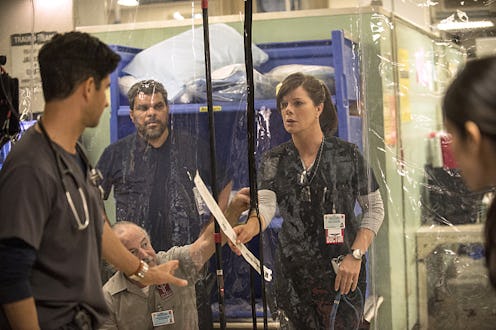
One of the toughest parts about watching Code Black, or any medical show, is keeping up with all of medical terminology that gets thrown around as though they are words that everyone understands. Code Black's medical terminology revolves specifically around emergency medicine and some of the factors related to actions that must be taken when there isn't much time, and there aren't many options for revival. It would make sense that in a medical setting no one would blink twice at the phrase "Sphenopalatine ganglioneuralgia," but it's a lot to ask an audience to be able to keep track of everything without referring to a medical dictionary every few seconds. Luckily, I've compiled some medical definitions and facts that can help you understand the context of Code Black next time you're watching the drama of Angels Memorial.
In addition to terminology, it also helps to understand the context of some of the medical cases. When the doctors give each other an upset and exhausted look when someone tells them their friend "only did some Molly," the implication is that that's a bad thing, but then the show picks back up at its mile-a-minute pace and Dr. Rorish is scolding Mario for his reckless behavior. So, things can get lost in the shuffle. Here are some terms and facts from the latest episode of Code Black that may help decode the show for you:
1. ABC – Airway, Breathing, Circulation
In emergency medicine, the "ABCs" aren't just the first letters of the alphabet. Doctors are told to remember the Airway, Breathing, and Circulation of the patient before tending to any other issues they have, because "compromise of any one of these 3 physiologic functions can mean rapid death for the patient." Mario tells Angus to remember his ABCs while Angus is trying to save a patient of his, referring to this idea.
2. Prisoners In The ER
Christa encounters a particularly evil prisoner, who is brought in for treatment and spends his time taunting Christa by telling her about the crimes he has committed. While it's possible a doctor could end up having to take care of a psychopath, the bigger threat of caring for prisoners is that they are "more likely to come in with more serious problems (ie, serious injuries from beatings or rape, higher STD rates, high tuberculosis infection, etc)."
3. Coronary Embolism
A coronary embolism occurs when a blood vessel is blocked (likely by a blood clot) within the heart. While a coronary embolism is dangerous, the most common type of embolism is a pulmonary embolism, which occurs when a blood vessel is blocked in the lungs.
4. Exploratory Laparotomy
An Exploratory Laparotomy is done when doctors need to obtain "information that is not available via clinical diagnostic methods." Doctors perform a Exploratory Laparotomy to search the abdominal area for a cause of pain, or to confirm an initial diagnosis.
5. MDMA Users In The ER
As "molly" has become a more popular drug, incidents of Ecstasy-related emergency room visits have increased dramatically. According to the Substance Abuse and Mental Health Administration, "Between 2005 and 2011, emergency room visits related to MDMA derivatives like ecstasy and molly rose by 128 percent among people younger than 21" If you or someone you know happens do be doing ecstasy, make sure they stay safe.
6. Decompensation
Decompensation can refer to "any failure of homeostatic mechanisms" from the liver to the heart any any body mechanics in-between. It's also a term used commonly in psychiatry for "the failure of defense mechanisms, which results in progressive personality disintegration."
7. Drunk Drivers In The ER
The most recent episode of Code Black shows a man who ends up getting his brother killed because he was driving drunk. You know not to drive drunk, right? 2.5 Million people go to the ER every year because of car accidents, many of those being drunk drivers. Just don't drive drunk.
These facts and terms should help make the next episode of Code Black easier to understand, but they also might drop the phrase orthostatic hypotension on you, so who knows?
Image: Neil Jacobs/CBS